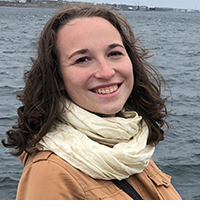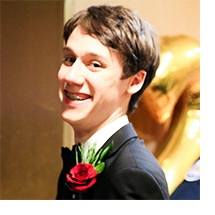As COVID-19 progressed in spring 2020, Scholars in Residence organizers and participating faculty worked diligently to transfer the residency to a completely online experience. Faculty supervisors and undergraduate RAs were able to find new ways to connect, share knowledge and experiences, and deepen the practice of mentored research.
As we open the call for Scholars in Residence 2021, three participants from last year share their experiences of the program—Morgan Beck, Marcus Forbes Green and Hannah Ahamedi.
Morgan Beck
 During Scholars in Residence last spring, I worked on Prof. Angela Esterhammer’s multivolume edition of the works of John Galt. This is an ongoing project, so I got to immediately start work where previous students had left off. My job during that month, along with my research group, was primarily working on transcribing archival newspaper printings of Galt’s work, and then drafting annotations for a contemporary reader. I enjoyed getting to approach texts in a totally different way than in an English class and to appreciate them in a unique context. One of the parts that interested me the most was having a glimpse into the process of publishing a book through an academic press, which was an element of this project that intrigued me initially!
During Scholars in Residence last spring, I worked on Prof. Angela Esterhammer’s multivolume edition of the works of John Galt. This is an ongoing project, so I got to immediately start work where previous students had left off. My job during that month, along with my research group, was primarily working on transcribing archival newspaper printings of Galt’s work, and then drafting annotations for a contemporary reader. I enjoyed getting to approach texts in a totally different way than in an English class and to appreciate them in a unique context. One of the parts that interested me the most was having a glimpse into the process of publishing a book through an academic press, which was an element of this project that intrigued me initially!
Being part of SiR offered me both a very cool research job, and a sense of academic community unlike the classroom setting. I loved having a workplace-like feeling, but in a job that used the skills I’ve learned in undergrad and with coworkers who were also students. Collaborating with my group, even online, was wonderful because we all got along very well, though it certainly made us all a little sad to not work together in person. Our version of group work was usually joining a zoom call, chatting for a couple minutes (hypothetically about Galt, but we often digressed), and then we would all sit quietly on the call doing our own work. Having the group there to ask questions, or even have more in-depth conversations about issues that came up—sometimes with Prof. Esterhammer joining us—offered a really lovely and useful working environment. We met quite frequently outside of our allotted SiR research hours, mostly to work, but we also had a great movie night, and generally tried to create some version of the in-person time we would have spent together! Working with such a great group of people was one of the highlights of SiR, and I’m so happy we made the effort to meet consistently even when we were each engaged in our own projects.
Marcus Forbes Green
 Dr. Shaun Ross's project was to create an annotated version of Virgil's Aeneid, with each annotation explaining how a specific section of the text was referenced in later Renaissance literature. Our group focused specifically on Book 4 of the Aeneid, where Aeneas leaves a distraught Dido and Carthage behind to found the city of Rome. Each of us in the group picked a different Renaissance Epic to analyze for allusions to Book 4. Personally, I read Dante's Purgatorio, which, of course, features Dante's version of Virgil as a guide through Purgatory. Together, the group created an annotated version of Book 4 with notes explaining references to the Aeneid in Dante's Divine Comedy, Camões' Os Lusíadas, Milton's Paradise Lost, and Ercilla's La Araucana.
Dr. Shaun Ross's project was to create an annotated version of Virgil's Aeneid, with each annotation explaining how a specific section of the text was referenced in later Renaissance literature. Our group focused specifically on Book 4 of the Aeneid, where Aeneas leaves a distraught Dido and Carthage behind to found the city of Rome. Each of us in the group picked a different Renaissance Epic to analyze for allusions to Book 4. Personally, I read Dante's Purgatorio, which, of course, features Dante's version of Virgil as a guide through Purgatory. Together, the group created an annotated version of Book 4 with notes explaining references to the Aeneid in Dante's Divine Comedy, Camões' Os Lusíadas, Milton's Paradise Lost, and Ercilla's La Araucana.
My overall SiR experience was good! It was actually my first time doing academic research outside out of class, and it was a great introduction to humanities research. Dr. Ross was a fantastic supervisor, and the additional workshops that the program offered (such as those on the Oxford Reference database and U of T Libraries) were quite helpful. I especially enjoyed the guest speaker sessions - the Q and A with the CBC's Science Correspondent Kelly Crowe was really illuminating, especially during the early days of the pandemic.
Definitely, my favourite part of the SiR experience was working with group members. Once we had read about half of our assigned epic poems, Dr. Ross had us do one-on-one zoom sessions with each other about the possible allusions we had found our assigned poems. It was helpful for the work itself, but it was also fun to get the chance to socialize while collaborating on the annotations, especially since the pandemic was pretty isolating right at the start.
Getting feedback on ideas for annotations worked quite well in an online format. Our group set up a workspace on slack, so anyone could toss out ideas and get a sense of whether other people thought that their annotation seemed plausible or not pretty immediately. I did feel that the larger connections between research groups were lost online, however. Our group didn't interact much with other SiR groups, which probably would have happened more if everyone was living in residence and going to the dining hall together, etc.
The one-on-one zoom sessions that I mentioned above were a big part of [trying to replicate social bonding], but we also did group meetings with all six of us (including Dr. Ross) on most mornings during the project. Having face-to-face meetings almost daily was really good, and it helped build community within our group quite effectively. More social events between research groups might have made the overall SiR program a bit more social, but under the unprecedented circumstances I was impressed with the amount of connection that the program facilitated.
Hannah Ahamedi
 I am a third-year student studying Peace, Conflict, and Justice with minors in Diaspora/Transnational Studies and History. I had the pleasure of being a member of the Scholars in Residence Program for the 2019-2020 period, working specifically with Dr. Rie Kijima. The team was compromised of seven students working together to help critically analyze, understand, and code education reforms from around the world. This was in collaboration with the Stanford Graduate School of Education.
I am a third-year student studying Peace, Conflict, and Justice with minors in Diaspora/Transnational Studies and History. I had the pleasure of being a member of the Scholars in Residence Program for the 2019-2020 period, working specifically with Dr. Rie Kijima. The team was compromised of seven students working together to help critically analyze, understand, and code education reforms from around the world. This was in collaboration with the Stanford Graduate School of Education.
Overall, my time in SiR was extremely beneficial to my growth as a student and researcher. Due to the COVID-19 pandemic, the program changed to being a fully online experience. Regardless, Professor Ira Wells and his team did an amazing job to ensure that all researchers had an enlightening and engaging experience. I think that my favourite part of the residency was getting to be in a digital research environment where I knew that my work was contributing to a larger goal. This sense of community and purpose was extremely motivating.
Applying to the SiR program, I was very unsure as to whether I belonged in a research environment. I had no prior experience working with a team in a research setting, thus making me wary of how well I would fit in. On the other hand, Dr. Kijima proved me wrong. She was able to create a dynamic, friendly, and creative workspace that allowed me to realize the passion I had for research and group projects. It was here that I felt accepted and appreciated. Working with her has been an absolute privilege and I aspire to embody the passion and empathy that she displayed to our team throughout the residency.


